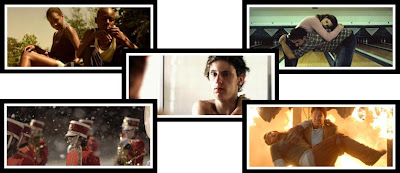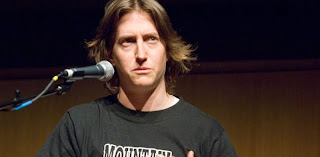 Robert here, continuing my series of the directors that shaped the past 10 years. Our next subject is a director who made his debut this decade and was immediately compared to Terrence Malick. Some have suggested that he’s faltered recently and maybe they’re right but his early films are such a high point in modern indie cinema he more than qualifies as one of the best directors of this decade. I’m talking about: David Gordon Green.
Robert here, continuing my series of the directors that shaped the past 10 years. Our next subject is a director who made his debut this decade and was immediately compared to Terrence Malick. Some have suggested that he’s faltered recently and maybe they’re right but his early films are such a high point in modern indie cinema he more than qualifies as one of the best directors of this decade. I’m talking about: David Gordon Green.Number of Films: Five
Modern Masterpieces: George Washington.
Total Disasters: None, though a few mixed efforts.
Better than you remember: Undertow, while flawed is still a worthwhile endeavor, better than the reaction it's been given.
Awards: Some Spirit Award noms, but not much else. Not enough.
Box Office: 89 mil for Pineapple Express, the expected winner.
Critical Consensus: George Washington was his best received film. All downhill from there.
Favorite Actor: Paul Schnieder and Danny McBride show up in two films a-piece.
Let’s talk about:
Growing up. And how do characters in David Gordon Green films grow up? They come to terms with the tragedies of their lives. Yes, it sounds depressing and David Gordon Green films live and die on whether they’re stylistically able to overcome that depression. George Washington is by far his most successful, and Green can credit both his cinematographer Tim Orr (for help with the Malick references), and a young cast that present the trials of youth with honestly and not condescension. Take this exchange between a young couple breaking up. Neither are old enough to understand the intricacies of relationships but they talk as if they do (as they’ve seen adults). She desires someone more mature. He asks to kiss her one more time. Of course, breaking up is a very minor tragedy in life (except when it's on the level of Green's second film). George Washington presents a much larger catastrophe to its young characters. And it’s how the film examines the urgency of this trauma juxtaposed against the meandering passage of childhood in a poor town where the film find's childhood's end.
In Green’s next film, All the Real Girls, the characters are considerably older, though still in need of maturing. Set in another small town again, that’ll have you screaming at the characters to “get out!” Paul Schnieder plays the town cad who genuinely falls for his best friend’s younger, innocent sister. These characters don’t possess enough self-awareness and understanding of their own emotions to make it work. And there's the tragedy. But Green never judges them. Instead he uses the backdrop of the run-down industrial town to frame their lack of direction, both internally and externally. The only way they can grow is when they’re forced to. Like it's predecessor, the film survives on its fantastic acting (that truly comprehends young love) and lyrical cinematography.
David Gordon Green
David Gordon Green’s next two films, while still good, endure considerably more difficulty in overcoming the weight of their tragedies. But these tragedies still fulfill their objective and force those around them into adulthood. Undertow takes a more suspenseful route, often echoing Night of the Hunter. Troubled teen Jamie Bell must straighten up enough to protect his younger brother and outrun evil uncle Josh Lucas as he hunts down a stash of gold. Critical reaction was mixed, and the theme of growth via tragedy while obviously present isn’t particularly deep. Still an ending more ambiguous than it first seems makes it an interesting entry in the Green canon. Snow Angels on the other hand, is David Gordon Green’s least successful film. Here the rub lies in the tragedy itself which feels like a plot point more than anything truly tangible and leaves the viewer cold.. But dependable David Gordon Green gets some fantastic performances out of his actors (Kate Beckinsale, Sam Rockwell, Michael Angarano and Olivia Thirlby) the latter two again capturing the experience of young love not often seen.
People were a bit startled when it was announced that Green would be partnering with Judd Apatow in 2008 for Pineapple Express. But knowing that both men were fascinated with the theme of individuals entering adulthood it was a natural fit. The film was sold mostly as an Apatow comedy with little attention payed to the talent or accomplishments of its actual director. But to know Green’s history is to know that this stoner comedy fits in perfectly with his oeuvre, as does the violence that surprised so many in the film (after all, what else would spur these men-children into adulthood?).
The country's current generation of 20-somethings are no strangers to the concept of adulthood spurred by tragedy. It's been a running theme of reality this past decade. So much that one would have to conclude that David Gordon Green is certainly a keen observer of the times. Another thing he keenly understands is that while independent dramas are great, they don't bring in the cash. Green's next project... another comedy.







4 comments:
Seriously? Ugh.
Anon, what are you "Seriously? Ugh"-ing about?
I've only seen Green's last three films - as far as I'm aware, George Washington hasn't received a release of any kind here. I've liked each of them to some degree, but haven't loved any. He seems to be best at getting great performances though. James Franco, Michael Agorano and Jamie Bell being the best in the three films I've seen.
I'm not sold as of yet. But I haven't seen enough. I was very much not in the significantly enthusiastic fan club of ALL THE REAL GIRLS
This was a more personal pick. Still Nathaniel, it appears that you're not the only one throwing little love his way.
Next week I'll have to set me sights one someone more universally beloved. Hmmmmmm...
Post a Comment